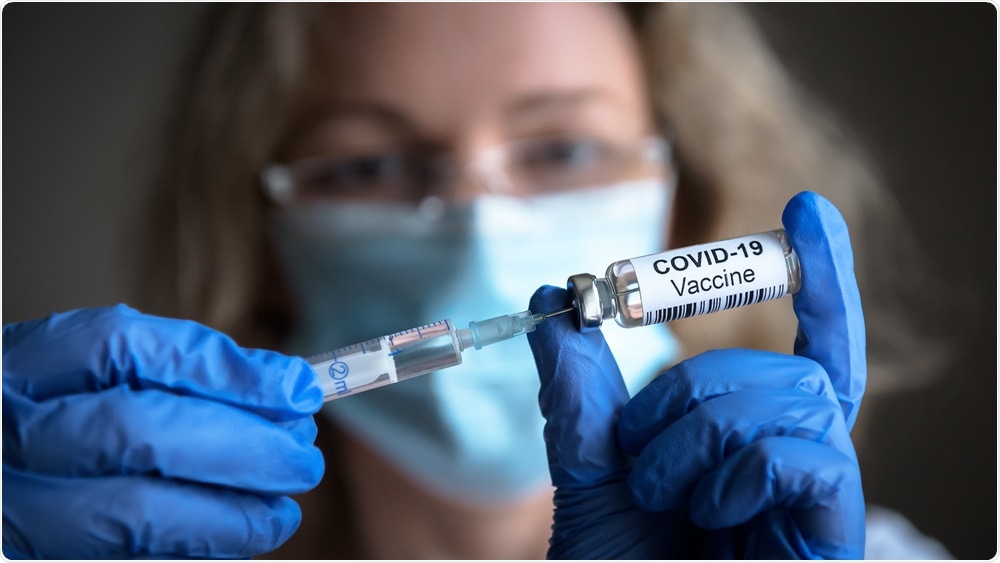Pfizer/BioNTech COVID-19 vaccine induces a stronger antibody response when given at an extended interval

Scientists from the University of Birmingham and the Public Health England, UK, have recently investigated the dynamics of immune responses in elderly people who have received two doses of the Pfizer/BioNTech coronavirus disease 2019 (COVID-19) vaccine at a standard or extended interval. The study findings reveal that an extended interval vaccination can enhance the humoral immune response by 3.5-fold. The study is currently available on the medRxiv* preprint server.

COVID-19 Vaccine. Image Credit: Viacheslav Lopatin/Shutterstock.com
Background
COVID-19 vaccines that are currently rolling out in many countries have shown considerable potency in controlling severe acute respiratory syndrome coronavirus 2 (SARS-CoV-2) infection and symptomatic COVID-19. The majority of these vaccines follow a two-dose regimen given at a fixed interval. In clinical trials, the highest immune response in vaccinated individuals has been observed 1 – 2 weeks after the 2nd dose.
However, to accelerate the vaccine coverage, some countries have planned to increase the interval between two doses so that a large proportion of the general population can be vaccinated with at least one vaccine dose. Studies determining vaccine efficacy in real-world pandemic situations have shown that this extended interval vaccination strategy is highly effective in inducing more robust immune responses.
In the current study, the scientists have examined the variation in immune response in elder people who received two doses of the COVID-19 vaccine BNT162b2 (Pfizer/BioNTech) either at a standard interval or at an extended interval.
The mRNA-based, spike-targeted BNT162b2 vaccine has shown more than 90% efficacy in reducing infection and symptomatic disease when administered with a three-week interval between the two doses. In addition, studies have shown that about 90% of elderly people (80 years and above) who received only a single dose of the vaccine develop humoral immune responses after 5 weeks of immunization.
Study design
The study was initially started with 172 individuals aged 80 years and above. Of all participants, 99 received the two doses of BNT162b2 vaccine at an interval of 3 weeks (standard interval); whereas, 73 participants received the two doses at an interval of 11 – 12 weeks (extended interval). However, in the final cohorts, 10 participants from the standard interval group and 5 participants from the extended interval group were excluded as they were seropositive against SARS-CoV-2.
The serum samples obtained from the vaccinated participants were analyzed for spike-specific antibodies to determine the intensity of the humoral immune response. Similarly, to determine the cellular immune response, peripheral blood mononuclear cells were isolated from whole blood samples and analyzed for interferon-γ secreting T cells.
Important observations
For the analysis, blood samples were collected at two time points. For participants who were vaccinated at a standard interval, the blood samples were collected at 2 – 3 weeks (peak response) and 8 – 9 weeks (durable response) after the 2nd dose.
For participants with an extended interval regimen, blood samples were taken at 5 -6 weeks after the 1st dose and 2 – 3 weeks (peak response) after the 2nd dose.
Humoral immune response
In the standard interval group, spike-specific antibodies were detected in 100% of participants at both time points. Among the participants, a peak antibody response was observed after the 2nd dose, followed by a 2.6-fold reduction over the subsequent weeks.
In the extended interval group, antibodies were detected in 91% and 100% of participants at the 1st and 2nd-time points, respectively. Among the participants, a 242-fold increase in antibody response was observed after the 2nd vaccine dose compared to the 1st dose. By comparing the robustness of humoral immunity after the 2nd vaccine dose, a 3.5-fold higher antibody response was observed in participants who were vaccinated with the extended interval regimen.
Cellular immune response
Among participants in the standard interval group, about 60% exhibited spike-specific T cell response 2 – 3 weeks after the 2nd dose. However, after 8 – 9 weeks, only 15% of them showed T cell response.
In contrast, only 8% of participants in the extended interval group demonstrated T cell response after the 1st dose. However, the proportion of participants increased to 31% after the 2nd vaccine dose.
By comparing the peak cellular responses after the 2nd dose, it was observed that the standard interval regimen is more effective than the extended interval regimen in inducing T cell response.
Study significance
The study findings highlight the importance of an extended interval regimen for the BNT162b2 COVID-19 vaccine in terms of inducing a stronger antibody response among elderly people. Although associated with a lower T cell response, an extended interval vaccination strategy can particularly be effective for providing long-lasting protection against SARS-CoV-2 infection among vulnerable individuals.
*Important Notice
medRxiv publishes preliminary scientific reports that are not peer-reviewed and, therefore, should not be regarded as conclusive, guide clinical practice/health-related behavior, or treated as established information.
- Parry HM. 2021. Extended interval BNT162b2 vaccination enhances peak antibody generation in older people. MedRxiv. https://www.medrxiv.org/content/10.1101/2021.05.15.21257017v1
Posted in: Medical Science News | Medical Research News | Disease/Infection News | Healthcare News
Tags: Antibodies, Antibody, Blood, Cell, Coronavirus, Coronavirus Disease COVID-19, Efficacy, Immune Response, Immunization, Pandemic, Public Health, Respiratory, SARS, SARS-CoV-2, Severe Acute Respiratory, Severe Acute Respiratory Syndrome, Syndrome, Vaccine

Written by
Dr. Sanchari Sinha Dutta
Dr. Sanchari Sinha Dutta is a science communicator who believes in spreading the power of science in every corner of the world. She has a Bachelor of Science (B.Sc.) degree and a Master's of Science (M.Sc.) in biology and human physiology. Following her Master's degree, Sanchari went on to study a Ph.D. in human physiology. She has authored more than 10 original research articles, all of which have been published in world renowned international journals.
Source: Read Full Article